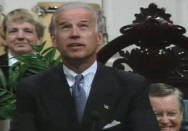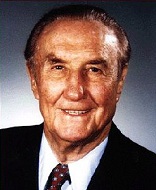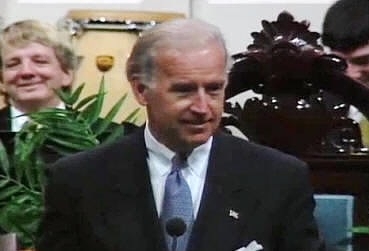[AUTHENTICITY CERTIFIED: Text version below transcribed directly from audio]
Nancy, Strom [Jr.], Julie and Paul:
James Strom Thurmond: Fritz [looking directly at Senator Ernest "Fritz" Hollings], he was one complex guy. For what else would explain that he asked, Iím told by Nancy, a guy named Biden from the state of Delaware to be one of his eulogists? Iíll never figure him out.
 And, Strom, I
wonít forgive it.
And, Strom, I
wonít forgive it.
Lindsey, I always thought I was in control, but I knew down deep I wasnít, and I think this is his last laugh. For what else could explain a Northeast liberalís presence here as the only outsider speaking today? With the possible exception of Vice President Cheney.
Strom Thurmond was the only man whom I knew who in a literal sense lived in three distinct and separate periods of American history, and lived what would have been considered a full life in each of those periods, particularly in his beloved South. Born into an era of essentially unchallenged and unexamined mores of the South, reaching his full maturity in a era of fully challenged and critically exam[in]ed bankrupt mores of his beloved South, and living out his final three decades in a South that had formally rejected its past on race. In each of these stages, in my observation -- and I was only with him the last three decades -- Strom represented exactly where he came from.
There's an old hymn that includes these lyrics:
Once to every man and nation comes the moment to decide,
In the strife of Truth with Falsehood, for the good or evil side;
...Then it is the brave man chooses while the coward stands aside....1
No one ever doubted Strom Thurmondís physical courage. Youíve heard much written about it. Not 15 years ago I was reminded of this. I was coming across to vote in the Senate and going up the escalator, and a fellow who apparently had held a longtime grudge against Senator Thurmond, a tourist, literally interposed himself between me and Strom and then said -- and Thad may remember this -- and said, "If you werenít so old, I would knock you" -- and, Reverend, I will not say what he said -- "I will knock you down." And I immediately stood between them. And Strom literally took off his coat and said, "Hold my coat, Joe." (Swear to God.) And I looked at him and said, "No, no, no, no, no, no." And with that, he went down and did 25 pushups. He had to be 88, 87. He stood up and looked at the man -- he said, "If you werenít so young Iíd knock you down."
Strom Thurmond was also a brave man, who in the end made his choice and moved to the good side. I disagreed deeply with Strom on the issue of civil rights and on many other issues, but I watched him change. We became good friends. Iím not sure exactly why or how it happened, Nancy [Thurmond], but you know we did. And Fritz [Hollings] could never figure it out. Neither could I. Fritz [Hollings] is my very closest friend in the Senate.
But I do know that friendship and death are great equalizers, where our differences become irrelevant and the only thing that is left is whatís in our heart.
I went to the Senate emboldened, angered, and outraged at age 29 about the treatment of African-Americans in this country, what everything that for a period in his life Strom had represented. But then I met the man. Our differences were profound, but I came to understand that as Archibald MacLeish wrote, "It is not in the world of ideas that life is lived: Life is lived for better or worse in life."2 Strom and I shared a life in the Senate for over 30 years. We shared a good life there, and it made a difference. I grew to know him. I looked into his heart and I saw a man, a whole man. I tried to understand him. I learned from him. And I watched him change oh so suddenly.
Like all of us, Strom was a product of his time. But he understood people. He cared for them. He truly wanted to help. He knew how to read people, how to move them, how to get things done. [Iíll] never forget we went down to see President Reagan. He and I had the Thurmond-Biden crime bill. And he was -- we sat in a room with Senator -- with President Reagan and with Ed Meese, Jim Baker, and William French Smith, the attorney general. And Strom started to try to convince the President to sign onto our bill, and he turned to me -- he said, "Joe, explain it to them." So I did my little bit, and it looked like the President was coming along.
And I swear to the Lord in the Lordís house this is a true story. And with that, as Ed Meese, Mr. Vice President, thought the President might be convinced, Ed Meese stood up and said, "Mr. President, time to go...time to go." And with that, the President very dutifully looked -- not dutifully, but very respectfully -- looked over and said, "Well, Strom" -- we were sitting next to him [on] either side -- "I have to go."
And he had his hands on the table, and the President -- the President went to get up like this -- the -- and Strom grabbed his arm and pulled him back down in his seat. I never saw anybody do that to a President. And the President -- true story -- President looked very sternly at Strom, and Strom said with his hands still on his arm, he said, "Mr. President, when ya'll get to be my age youíll understand you've got to compromise." And the President then was about 85 years old.
Strom knew America was changing, and that there was a lot he didnít understand about that change. Much of that change challenged many of his long-held views. But he also saw his beloved South Carolina and the people of South Carolina changing as well, and he knew the time had come to change himself. But I believe the change came to him easily. I believe he welcomed it, because I watched others of his era fight that change and never ultimately change.
It would be humbling to think that I was among those who had some influence on his decision, but I know better. The place in which I work is a majestic place. If youíre there long enough, it has an impact on you. You cannot, if you respect those with whom you serve, fail to understand how deeply they feel about things differently than you. And over time, I believe it has an affect on you.
This is a man, who in 1947, the New York Times ran a lead editorial saying, "Strom Thurmond, Hope of the South," and talked about how he had set up reading programs, get better books for separate, but equal schools. This is a man who was opposed to the poll tax. This is a man who I watched vote for the extension of the Voting Rights Act. This is a man who I watched vote for the Martin Luther King Holiday. And itís fairly easy to say today that that was pure political expediency, but I choose to believe otherwise. I choose to believe that Strom Thurmond was doing what few do once they pass the age of 50: He was continuing to grow, continuing to change.
His offices were next door to mine in the Russell Building, or more appropriately mine were next to his. And over the years, I remember seeing a lot change, including the number of African-Americans on his staff and African-Americans who sought his help.
For the man who will see, time heals, time changes, and time leads him to truth. But only a special man like Strom would have the courage to accept it, the grace to acknowledge it, and the humility in the face of lasting enmity and mistrust to pursue it until the end.
Thereís a personal lesson that comes from a page in American political history that is yet unwritten, but nevertheless, it resonates in my heart. I mentioned it on the floor of the Senate the other day. Itís a lesson of redemption that I think applies today, and I think Strom, as he listens, will appreciate it.
When I first arrived in the Senate in 1972, I met with John Stennis, another old Southern Senator, who became my friend. We sat at the other end of this gigantic, grand mahogany table he used as his desk that had been the desk of Richard Russellís. It was a table upon which the Southern Manifesto was signed, I am told. The year was 1972. Senator Stennis patted the leather chair next to him when I walked in to pay my respects as a new, young Senator, which was the order of the day. And he said, "Sit down, sit down, sit down here, son." And those who served with him know he always talked like this [pointing index finger gesture with right arm extended]. And he looked at [me] and he said, "Son, what made you run for the Senate?" And like a darn fool I told him the exact truth before I could think of it -- I said, "civil rights, sir." And [as] soon as I did I could feel the beads of perspiration pop out of my head and get that funny feeling. He looked at me and said, "Good, good, good." And that was the end of the conversation.
Well -- Well, 18 years later, after us having shared a hospital suite for three months at Walter Reed and after him having tried to help me in another pursuit I had, weíd become friends. I saw him sitting behind that same table 18 years later, only this time in a wheelchair. His leg had been amputated because of cancer. And I was going to look at offices because in my seniority his office was available as he was leaving.
I went in and sat down and he looked at me as if it were yesterday and he said, "Sit down, Joe, sit down," and tapped that chair. And he said something that startled me. He said, "Remember the first time you came to see me, Joe?" And I shook my head, I didnít remember. And he leaned forward and he recited the story. I said to him, "I was a pretty smart young fellow, wasnít I, Mr. Chairman?" He said, "Joe, I wanted to tell you something then that Iím going to tell you now. Ya'll going to take my office, arenít you?" And I said, "Yes, sir, Mr. Chairman."
And he ran his hand back and forth across that mahogany table in a loving way, and he said, "You see this table, Joe?" This is the Godís truth. He said, "You see this table?" And I said, "Yes, sir, Mr. Chairman." He said, "This table was the flagship of the Confederacy from 1954 to 1968." He said, "We sat here, most of us from the Deep South, the old Confederacy, we planned the demise of the civil rights movement." Then he looked at me and said, "And now itís time, itís time that this table go from the possession of a man against civil rights to a man who is for civil rights."
And I was stunned. And he said, "One more thing, Joe," he said. "The civil rights movement did more to free the white man than the black man." And I looked at him, I didnít know what he meant. And he said in only John Stennis fashion, he said, "It freed my soul; it freed my soul."
Strom Thurmondís soul is free today. His soul is free. The Bible says,
Learn to do well, seek judgment, relieve the oppressed, judge the fatherless, plead for the widow. Come now and let us reason together [saith the Lord]: though your sins may be as scarlet, they shall be as white as snow....3
Strom, today there are no longer any issues to debate; thereís only peace, a patch of common ground and the many memories that youíve left behind.
For me, those memories are deeply personal, and they will stay with me as long as I live. Strom Thurmond stood by me when others didnít, and it was against -- when it was against his political interest to do so.
I had been accused of something terrible, in my view, on the eve of the Bork nomination. I gathered the entire Senate -- I was then chairman -- the entire Judiciary Committee, and I said to Democrats and Republicans alike, "I will stand aside as chairman so it will not affect this proceeding." And the first man to jump to his feet was your father, and he said, "No." And I said, "Well, let me explain." He said, "You donít have to explain anything to me. Youíre my chairman." And with that, everyone ad seriatim stood up, but Strom Thurmond was the first man on his feet -- did not seek a single explanation for what I had been accused of. And clearly, when partisanship was a winning option, he chose friendship, and Iíll never forget him for it. I was honored to work with him, privileged to serve with him, and proud to call him my friend.
His long life may well have been a gift of his beloved God, but the powerful and lasting impact he had on his beloved South Carolina and on his nation is Stromís legacy, his gift to all of us.
And he will be missed.
The British essayist William Hazlitt once wrote (quote): "Death conceals4 everything but truth, and strips a man of everything but genius and virtue. Itís a sort of natural canonization."5
The truth and genius and virtue of Strom Thurmond is what I choose and we all choose to remember today.
To Nancy, to Strom [Jr.], to Julie, and to Paul, to all his friends, to the people of South Carolina who knew him so well and loved him so much: America mourns with you. I mourn with you. For I knew Strom well. I felt his warmth as you did. I saw his strength as you did. I was the beneficiary of his virtues, as you were. And Iíll miss him as you will, as we all will.
But he lived a long and good life. And I know that today a benevolent God has lifted his arms to Strom. I just donít know what Strom is saying to that benevolent God, because you know heís saying something.
So I say, Farewell, Mr. Chairman. We stand in adjournment until we meet again.

1 Once to Every Man and Nation by James Russell Lowell
2 "Return from the Excursion", Riders on Earth (1978) by Archibald MacLeish
4 ..."conceals" should be "cancels" (see "Spirit of the Age" link below).
5 The Spirit of the Age/Lord Byron, by William Hazlitt.
Audio Source: C-SPAN.org
Images #1 and #2 (Screenshots) Source:
YouTube.com
Page Updated: 1/20/21
U.S. Copyright Status: Text = Public domain (delivered by a U.S. Senator in the course of his official duties). Audio = Property of AmericanRhetoric.com. Image of Thurmond = Public domain. Images of Biden = Fair Use.

